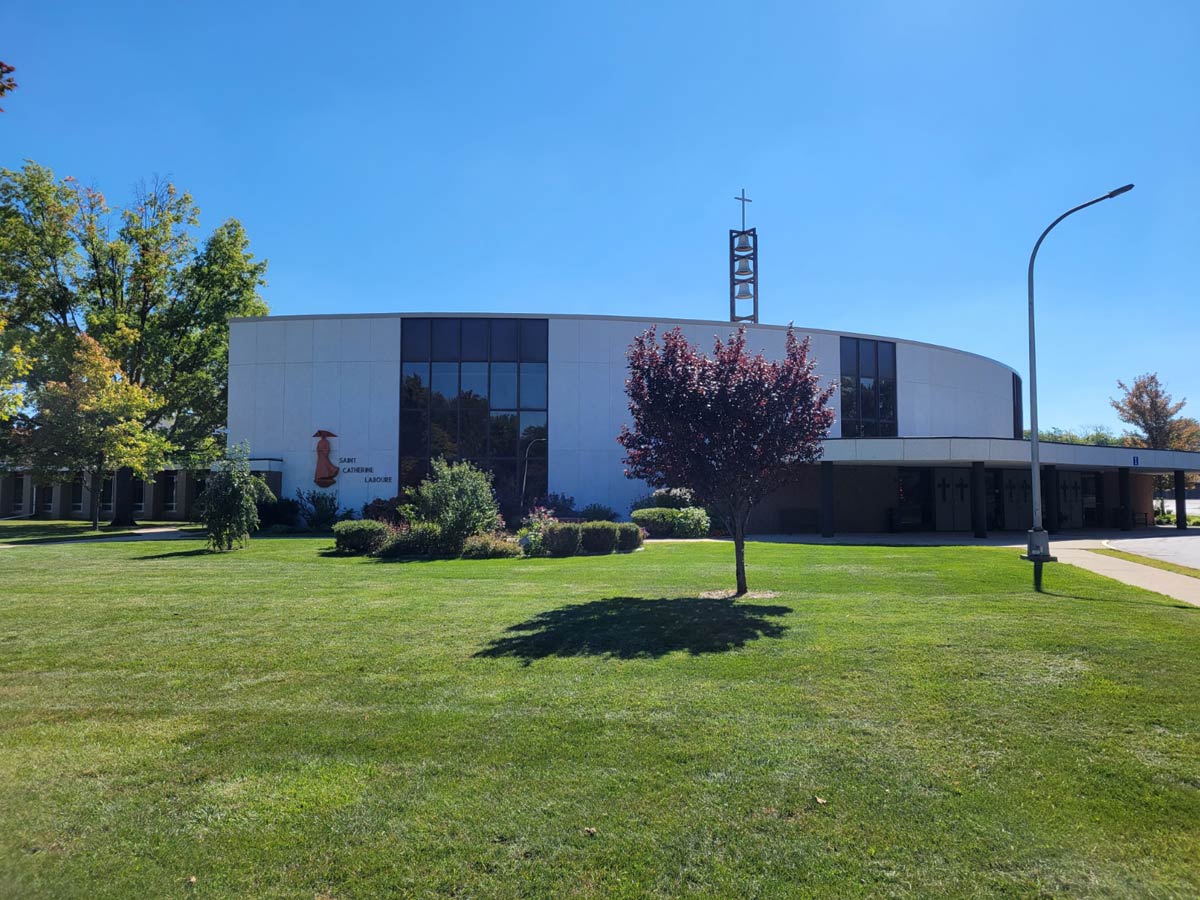Fr. Lara's Lines

Saints Peter and Paul, Apostles
The Church celebrates the feast of the apostles Peter and
Paul. These two apostles are two of the most prominent
figures in the early Christian Church. They played an
essential role in spreading the teachings of Jesus Christ and
establishing the foundation of Christianity. Though their lives
and ministries differed in many ways, their commitment to
the Gospel reflects their deep faith and devotion to Jesus’
mission.
Saint Peter
Peter, originally named Simon, was a fisherman by trade.
He was called by Jesus to be one of His first disciples to
become a “fisher of men.” Leaving everything, he became
His disciple. Later he confessed Jesus to be the Messiah:
“Jesus asked his disciples, who do people say that I am?...
Simon Peter answered, you are the Christ, the Son of the
living God.” This profound expression of Peter’s faith
empowered his zeal to share in Jesus’ mission. Saint Peter is
known as the rock of the Church or the first pope. In the
Gospel of Matthew, Jesus directs Peter to be the leader of
the Church: “I say to you that you are Peter, and on this
rock, I will build My church; and the gates of the
netherworld will not overpower it” (Matthew 16:18). This
statement became the foundation of Peter’s role as the first
pope, a spiritual leader for all Christians. Peter's leadership
was one of service, humility, and guidance for the early
Christian community. He was entrusted with the responsibility
to "feed my sheep" (John 21:17), which refers to his role in
guiding the faithful and safeguarding the teachings of
Christ.
Peter’s position as the leader of the Church is evident in the
New Testament. He often acted as the representative for the
Apostles. Peter’s letters, particularly his First and Second
Epistles, offer profound insights into Christian living. One of
the key themes in his writings is the importance of faith in the
midst of suffering. Peter urged Christians to endure suffering
with patience, just as Christ did. He acknowledged that
suffering leads to refining one’s faith, and that Christians
should rejoice in it because it leads to spiritual growth and
ultimate salvation. Peter embraced suffering to the point of
death. He was sentenced to be crucified, and he decided to
be crucified upside down since he was unworthy to be equal
to Christ. Peter’s humility and service to others flourished
while proclaiming the Gospel of Jesus Christ. His teachings
were both practical and spiritual, aimed at helping early
Christians maintain their faith even in the midst of suffering.
Saint Paul
Paul, originally named Saul, was a Pharisee who initially
persecuted Christians. On the road to Damascus, Paul
encountered the risen Christ: “As he neared Damascus on his
journey, suddenly a light from heaven flashed around him.
He fell to the ground and heard a voice say to him – Saul,
Saul, why do you persecute me? Who are you, Lord, Saul
asked. I am Jesus, whom you are persecuting, He replied.
Now get up and go into the city, and you will be told what
you must do” (Acts 9:3-5). After this encounter, Paul became
one of the most ardent advocates for the Christian faith. His
mission was primarily to spread the Gospel to the Gentiles.
Paul’s travels, recorded in the Acts of the Apostles and his
letters, took him across the Roman Empire, from Jerusalem to
Rome, planting churches and nurturing communities of
believers. He wrote numerous letters to Christian
communities, offering theological teachings and practical
advice. Paul is known as the Apostle to the Gentiles for his
mission to the non-Jewish communities.
While Peter focused on bringing Jesus to the Jewish Christian
community, Paul primarily reached out to the Gentiles. Both
apostles are crucial to the spread of the faith to the world.
Their leadership and teachings on the Gospel values remain
foundational to Christian belief and practice. Their lives and
writings continue to inspire Christians around the world, and
their martyrdom in Rome serves as a powerful witness to
their faithfulness to Christ.
4th of July
As we celebrate the 4th of July, we are reminded of the gift
of freedom. We are so blessed to live in this nation, where
freedom and justice are valued and sought after. This
holiday, which marks the birth of our nation, invites us to
reflect on the courage, sacrifice, and faith of those who
fought for the liberties we hold dear. As a community of
faith, we recognize that true freedom is not only found in
political independence but also in the freedom we have in
Christ.
In the Gospels, Jesus often talks about freedom from Sin.
This freedom is one that transcends all earthly boundaries. It
is the freedom to live in His love, to serve one another, and
to share the Good News with the world. The 4th of July is
celebrated with fireworks, parades, concerts, and family
gatherings. It is a day to celebrate our nation and to enjoy
one another’s company. As we enjoy this time of celebration
with family and friends, let us also remember the
responsibility we have to love and care for others, and to
work toward justice and peace for all.
May this 4th of July be a reminder of the blessings of both
our national and spiritual freedoms. Let us celebrate with
grateful hearts, seeking God’s guidance as we continue to
live out our calling to be His light in the world. Happy 4th!
Peace
Fr. Lara
The Pope's Intention for the Month of June
 That the world might grow in compassion
That the world might grow in compassion
That each one of us might find consolation
in a personal relationship with Jesus, and
from His Heart, learn to have compassion
on the world
Recognize God in Your Oridinary Moments - By Colleen Jurkiewicz Dorman
Mini Reflection:People have a lot of
opinions about God. But when the world asks, “Who
do you say that Jesus is?” We know the answer.
Will we speak up?
Some Say
At first, the Apostles try to dodge the question.
When Jesus confronts them — and make no
mistake, it is a confrontation — with the question
“Who do you say that I am?” they act like a man
whose wife has just asked him if she looks fat in
these jeans.
The evasiveness of their answer puts politicians to
shame: “Some say John the Baptist, others Elijah, still
others Jeremiah or one of the prophets.”
Some say.
But Jesus doesn’t let them off easy. He repeats
himself. He wants an answer. “Who do you say that
I am?”
They all know the answer. They all believe the
answer. And they all know the answer could get
them thrown in prison or killed. Only Peter is brave
enough to say it: “You are the Christ, the Son of the
Living God.”
People have a lot of opinions about God. They
always have. They have a lot of opinions about
Jesus and the Bible, about the Catholic Church and
the Pope. Some of these opinions are well-founded,
well-researched. Some of them are based in
ignorance. Many are born of painful
misunderstandings. But they are all just that:
opinions.
Some say.
We know who Jesus is. We know who the Eucharist
is. We know what the truth is. Amid the chaos and
the violence and the excruciating loudness of this
fallen world and all the words it shouts into the void
about God and Jesus and right and wrong, we
know.
But will we answer?
©LPi
Honor Our Military
Please take time to give thanks for those who have served and
are serving in our military and to pray for the safety of those who
may currently be in harm’s way. In a special way, we thank and
pray for these parishioners and relatives of parishioners.
Dear God,
We pray in gratitude for all of those who have defended
peace, virtue, and justice with honor. We pray especially
for those who have suffered in mind and body from the
ravages of war. May Your peace reign in our hearts
and in our world. Amen.
He Who Sacrificed His Life
†JOHN A. STONIS, Grandson of John & Dorthy Stonis
†CHRISTOPHER ZIMNY
Those Still Serving
CRAIG BEHRENDT, Grand-nephew of Sister Mary Helen
DANIEL BELZER, Nephew of Dave & Bev Belzer
RYAN BLOCHBERGER, Nephew of Mae Grady
JESSICA CAMERON, Niece of the Cameron Family
BRYAN DUFF, Son of Julie Duff
TIMOTHY DWORKIN, Grandson of Barbara Bouska
MICHAEL FOLEY
JOHN FOLEY
RYAN FONTILLAS
DANIEL FRAYNA
ALEXIS GONZALES, Great-niece of Eden & Lyle Gonzales-Nemzin
JOSEPH GULLO
MICHAEL T. HAHN, Grandson of John & Dorthy Stonis
SANG HOON LEE
MICHAEL KELLY, Nephew of Kevin and Kathy Kelly
JACK MAHON, JR., Son of Jack, Sr. & Eileen Mahon
JAY MARTIN, Nephew of Becky and Tom Brennan
MORRIS COREY MCMAHON, Son of Chris & Julie McMahon
PETER MULLER
MATTHEW NEUBAUER, Nephew of Dan & Judy Neubauer
ANTHONY PALMERO
JOHN PODCZASKI, Grandson of Genevieve Podczaski
NAILL SWIDER, Grand-nephew of Alice Swider
STEVEN TUMBARELLO, Son of Sylvia & Vince Tumbarello
EUGENE WALL, Nephew of Suzanne Lessner
To add or remove someone, please send the person’s name and relationship (optional) to bulletin@stcatherinelaboure.com
Please Pray for Ukraine
For our sisters and brothers involved in or
affected by the war and devastation in Ukraine--
the deceased, the injured, the frightened, the
displaced, the fighters, the protesters, the leaders.
May God give them solace, healing, comfort, and
hearts and minds directed toward peace.
Donations can be made here:
Knights of Columbus: https://www.kofc.org/secure/en/donate/ukraine.html
Caritas: https://www.caritas.org/
Ukrainian Catholic Archdiocese of Philidelphia: https://ukrarcheparchy.us
"May the Queen of Peace preserve the world from the madness of war" - Pope Francis
Neighbors of other Faiths
The Golden Rule
Excerpted from charterforcompassion.org/the-golden-rule-in-seven-major-religions
We may speak of great differences in
religious beliefs and forms of worship
around the world. Called by an endless
number of names, all, however, recognize and worship a Supreme
Being. And all religions, somewhere in their sacred literature,
expound the fundamental philosophy of the Golden Rule.
Buddhism: Hurt not others with that which pains yourself.
~ Buddha, Undanavarga 5:18
Christianity: Therefore all things whatsoever ye would that all men
should do to you, do ye even so to them.
~ Matthew 7:12
Confucianism: What you do not want done to yourself, do not do
to others.
~ Confucius, Analects 15:23
Hinduism: Good people proceed while considering what is best
for others is best for themselves.
~ Hitopadesa
Islamism: No one of you is a believer until he loves for his brother
what he loves for himself.
~ Mohammed, Traditions
Judaism: And thou shalt love thy neighbor as thyself.
~ Leviticus 19:18
Zoroastrianism: Whatever is disagreeable to yourself do not do
unto others.
~ Shayast-na-Shayast 13:29
